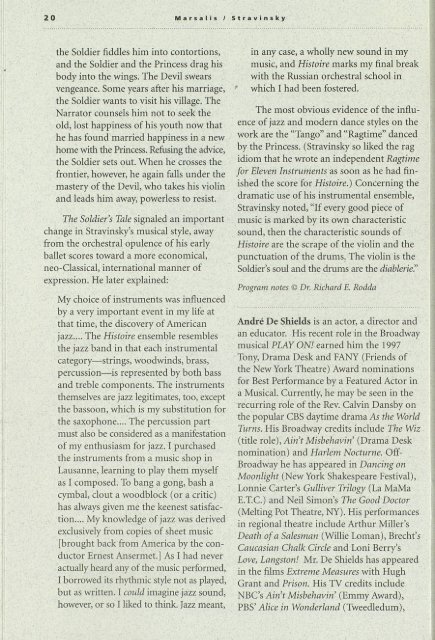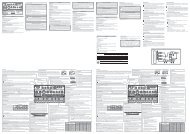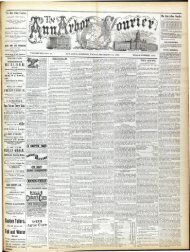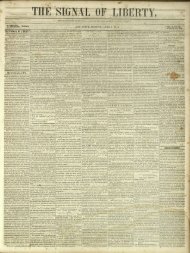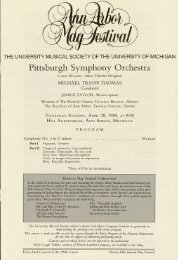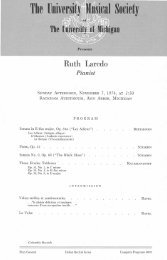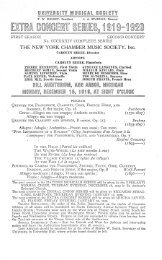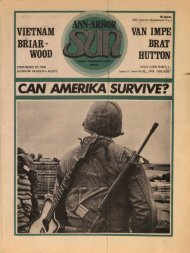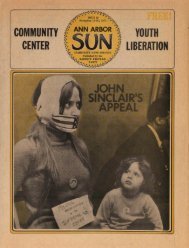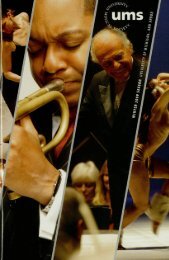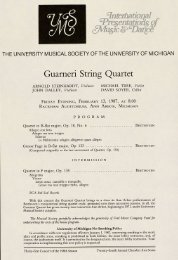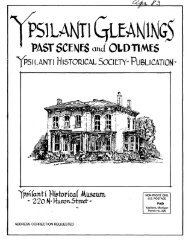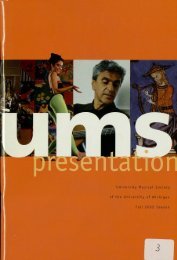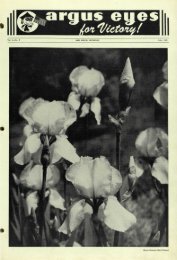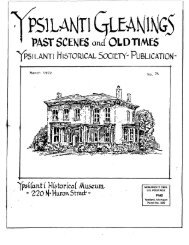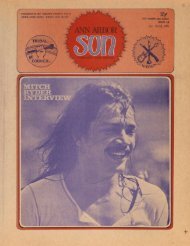Societyof the University of Michigan - Ann Arbor District Library
Societyof the University of Michigan - Ann Arbor District Library
Societyof the University of Michigan - Ann Arbor District Library
You also want an ePaper? Increase the reach of your titles
YUMPU automatically turns print PDFs into web optimized ePapers that Google loves.
20 Marsalis / Stravinsky<br />
<strong>the</strong> Soldier fiddles him into contortions,<br />
and <strong>the</strong> Soldier and <strong>the</strong> Princess drag his<br />
body into <strong>the</strong> wings. The Devil swears<br />
vengeance. Some years after his marriage,<br />
<strong>the</strong> Soldier wants to visit his village. The<br />
Narrator counsels him not to seek <strong>the</strong><br />
old, lost happiness <strong>of</strong> his youth now that<br />
he has found married happiness in a new<br />
home with <strong>the</strong> Princess. Refusing <strong>the</strong> advice,<br />
<strong>the</strong> Soldier sets out. When he crosses <strong>the</strong><br />
frontier, however, he again falls under <strong>the</strong><br />
mastery <strong>of</strong> <strong>the</strong> Devil, who takes his violin<br />
and leads him away, powerless to resist.<br />
The Soldier's Tale signaled an important<br />
change in Stravinsky's musical style, away<br />
from <strong>the</strong> orchestral opulence <strong>of</strong> his early<br />
ballet scores toward a more economical,<br />
neo-Classical, international manner <strong>of</strong><br />
expression. He later explained:<br />
My choice <strong>of</strong> instruments was influenced<br />
by a very important event in my life at<br />
that time, <strong>the</strong> discovery <strong>of</strong> American<br />
jazz.... The Histoire ensemble resembles<br />
<strong>the</strong> jazz band in that each instrumental<br />
category—strings, woodwinds, brass,<br />
percussion—is represented by both bass<br />
and treble components. The instruments<br />
<strong>the</strong>mselves are jazz legitimates, too, except<br />
<strong>the</strong> bassoon, which is my substitution for<br />
<strong>the</strong> saxophone.... The percussion part<br />
must also be considered as a manifestation<br />
<strong>of</strong> my enthusiasm for jazz. I purchased<br />
<strong>the</strong> instruments from a music shop in<br />
Lausanne, learning to play <strong>the</strong>m myself<br />
as I composed. To bang a gong, bash a<br />
cymbal, clout a woodblock (or a critic)<br />
has always given me <strong>the</strong> keenest satisfac<br />
tion.... My knowledge <strong>of</strong> jazz was derived<br />
exclusively from copies <strong>of</strong> sheet music<br />
[brought back from America by <strong>the</strong> con<br />
ductor Ernest Ansermet] As I had never<br />
actually heard any <strong>of</strong> <strong>the</strong> music performed,<br />
I borrowed its rhythmic style not as played,<br />
but as written. I could imagine jazz sound,<br />
however, or so I liked to think. Jazz meant,<br />
in any case, a wholly new sound in my<br />
music, and Histoire marks my final break<br />
with <strong>the</strong> Russian orchestral school in<br />
' which I had been fostered.<br />
The most obvious evidence <strong>of</strong> <strong>the</strong> influ<br />
ence <strong>of</strong> jazz and modern dance styles on <strong>the</strong><br />
work are <strong>the</strong> "Tango" and "Ragtime" danced<br />
by <strong>the</strong> Princess. (Stravinsky so liked <strong>the</strong> rag<br />
idiom that he wrote an independent Ragtime<br />
for Eleven Instruments as soon as he had fin<br />
ished <strong>the</strong> score for Histoire.) Concerning <strong>the</strong><br />
dramatic use <strong>of</strong> his instrumental ensemble,<br />
Stravinsky noted, "If every good piece <strong>of</strong><br />
music is marked by its own characteristic<br />
sound, <strong>the</strong>n <strong>the</strong> characteristic sounds <strong>of</strong><br />
Histoire are <strong>the</strong> scrape <strong>of</strong> <strong>the</strong> violin and <strong>the</strong><br />
punctuation <strong>of</strong> <strong>the</strong> drums. The violin is <strong>the</strong><br />
Soldier's soul and <strong>the</strong> drums are <strong>the</strong> diablerie"<br />
Program notes © Dr. Richard E. Rodda<br />
Andre De Shields is an actor, a director and<br />
an educator. His recent role in <strong>the</strong> Broadway<br />
musical PLAY ON! earned him <strong>the</strong> 1997<br />
Tony, Drama Desk and FANY (Friends <strong>of</strong><br />
<strong>the</strong> New York Theatre) Award nominations<br />
for Best Performance by a Featured Actor in<br />
a Musical. Currently, he may be seen in <strong>the</strong><br />
recurring role <strong>of</strong> <strong>the</strong> Rev. Calvin Dansby on<br />
<strong>the</strong> popular CBS daytime drama As <strong>the</strong> World<br />
Turns. His Broadway credits include The Wiz<br />
(title role), Ain't Misbehavin' (Drama Desk<br />
nomination) and Harlem Nocturne. Off-<br />
Broadway he has appeared in Dancing on<br />
Moonlight (New York Shakespeare Festival),<br />
Lonnie Carter's Gulliver Trilogy (La MaMa<br />
E.T.C.) and Neil Simon's The Good Doctor<br />
(Melting Pot Theatre, NY). His performances<br />
in regional <strong>the</strong>atre include Arthur Miller's<br />
Death <strong>of</strong> a Salesman (Willie Loman), Brecht's<br />
Caucasian Chalk Circle and Loni Berry's<br />
Love, Langston! Mr. De Shields has appeared<br />
in <strong>the</strong> films Extreme Measures with Hugh<br />
Grant and Prison. His TV credits include<br />
NEC's Ain't Misbehavin' (Emmy Award),<br />
PBS' Alice in Wonderland (Tweedledum),


